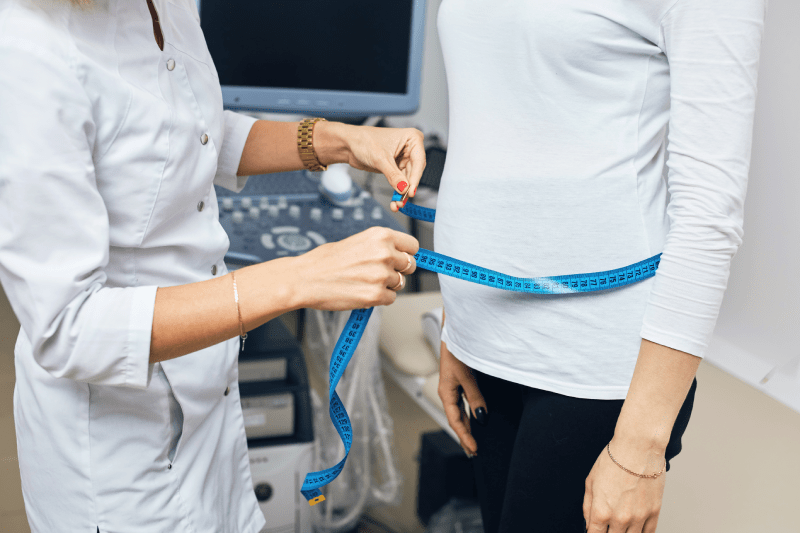Which Surgery Is Superior In Terms Of Weight Loss Potential?
In general, the Mini Gastric Bypass (MGB) offers a higher rate and more permanent excess weight loss (EWL) potential compared to Sleeve Gastrectomy, due to its dual mechanism of restricting food intake and reducing nutrient absorption (malabsorption). MGB patients typically manage to lose 70-80% of their excess weight, whereas this rate is generally around 60-70% for Sleeve Gastrectomy patients. However, the final results achieved in both procedures largely depend on the patient’s long-term compliance with post-operative nutrition and exercise guidelines. Success is not solely dictated by the surgical technique but by the dedication to the required comprehensive lifestyle overhaul that follows the operation.
What Is The Fundamental Difference Between Sleeve Gastrectomy And Mini Gastric Bypass?
The fundamental difference lies in the operating mechanisms of the procedures. Sleeve Gastrectomy permanently removes approximately 80% of the stomach, creating only a restrictive effect. Mini Gastric Bypass, on the other hand, creates a small pouch and separates a portion of the small intestine from the food path, generating both a restrictive and a malabsorptive effect. This dual mechanism makes MGB a stronger option in terms of metabolic benefits, but it also necessitates a greater dependency on vitamin supplementation throughout the patient’s life to prevent nutritional deficiencies.
Which Procedure Is More Effective In Achieving Remission Of Type 2 Diabetes?
Mini Gastric Bypass is generally more effective than Sleeve Gastrectomy in achieving remission of Type 2 Diabetes because it activates the small intestine earlier, significantly increasing the secretion of important appetite and insulin-regulating hormones (especially GLP-1). The metabolic effect of MGB rapidly improves insulin resistance, even independent of weight loss. While Sleeve Gastrectomy can also resolve diabetes, MGB’s remission rates are higher, particularly in patients with a high BMI and long-standing diabetes, making it a powerful metabolic intervention.
Do Operation Times And Hospital Stay Durations Differ?
Sleeve Gastrectomy surgery usually takes 45-60 minutes and may be slightly shorter than Mini Gastric Bypass (typically 60-90 minutes) because it involves fewer surgical steps. Since both procedures are performed laparoscopically (keyhole surgery), the hospital stay durations are quite similar, usually ranging between 2 to 3 nights. The shorter operating time and simplified procedure might make Sleeve Gastrectomy the initial choice for some surgeons, but this difference does not significantly affect the patient’s overall recovery speed.
Why Does Mini Gastric Bypass Carry A Higher Risk Of Nutrient Malabsorption?
Mini Gastric Bypass naturally carries a higher risk of nutrient malabsorption because it temporarily bypasses approximately 150 to 250 cm of the small intestine from the food stream. This means that micronutrients like iron, Vitamin B12, Vitamin D, and calcium cannot be adequately absorbed by the body. Therefore, MGB patients are obliged to use supplements at higher doses and more strictly for life compared to Sleeve Gastrectomy patients, as failure to comply could lead to serious, chronic health issues over time.
Which Option Is Better For Patients With Gastroesophageal Reflux Disease (GERD)?
For patients suffering from Gastroesophageal Reflux Disease (GERD) or severe heartburn, Mini Gastric Bypass is generally a more suitable option. Sleeve Gastrectomy may worsen reflux or cause new reflux in some patients due to the increased pressure on the lower esophageal sphincter from the new tubular shape of the stomach. Although MGB carries different risks like bile reflux by bypassing the lower part of the stomach, it typically tends to improve acid reflux symptoms significantly, offering relief to those with pre-existing severe symptoms.
In Which Surgery Is The Risk Of Dumping Syndrome Higher?
The risk of Dumping Syndrome is higher in Mini Gastric Bypass compared to Sleeve Gastrectomy because MGB facilitates the rapid transit of nutrients from the stomach to the small intestine. Dumping leads to uncomfortable symptoms like nausea, sweating, and palpitations, especially after consuming high-sugar or fatty foods quickly. While this may seem like a disadvantage for MGB patients, it actually serves as a natural deterrent, encouraging patients to avoid harmful foods and thereby supporting long-term weight maintenance.
Which Surgery Is Advantageous In Terms Of Reversibility?
Mini Gastric Bypass is technically a reversible procedure because it is possible to surgically restore the connection points of the intestine. In contrast, Sleeve Gastrectomy is irreversible because a large portion of the stomach is permanently removed. While this offers a theoretical advantage to MGB, both surgeries are major procedures requiring serious and permanent changes, and patients rarely find themselves needing to consider the reversal option unless severe complications occur.
How Is The Long-Term Weight Maintenance Success Of Both Surgeries?
Both surgeries have high success rates in treating obesity over the long term, but Mini Gastric Bypass generally shows slightly superior long-term results. The added malabsorption component of MGB helps patients maintain the weight they have lost more effectively. The critical factor determining success, however, remains the same for both groups: continuous commitment to lifestyle changes, including a protein-focused diet and regular exercise, and consistent medical follow-up appointments.
How Does The Restrictive Mechanism Of Sleeve Gastrectomy Work?
Sleeve Gastrectomy permanently removes the large outer curvature of the stomach, which produces the Ghrelin (hunger hormone) and is stretchable. What remains is a narrow, long stomach tube, roughly the size of a banana. This tube both provides physical restriction, allowing the patient to feel full with a very small amount of food, and suppresses appetite by reducing the production of the Ghrelin hormone. Since the surgery does not involve the small intestine, it does not lead to malabsorption.
Which Procedure Has A More Potent Effect On Hormonal Changes?
Although both surgeries suppress appetite by reducing the Ghrelin hormone, Mini Gastric Bypass has a stronger and more comprehensive effect on metabolic hormones. MGB allows food to reach the lower sections of the small intestine faster, significantly triggering the release of incretin hormones like GLP-1 and Peptide YY, which increase satiety and insulin sensitivity. This provides MGB with a clear advantage in the resolution of Type 2 diabetes and other metabolic syndromes, contributing to superior long-term health outcomes.
Is The Pre-Operative Liver Shrinkage Diet Necessary For Both?
Yes, the pre-operative liver shrinkage diet is mandatory for both surgeries, regardless of the specific procedure. The main goal of this diet (usually a low-calorie, high-protein liquid diet) is to reduce the fat content of the liver, causing the organ to shrink and soften. A shrunken liver allows the surgeon safer and easier access to the stomach with laparoscopic instruments, thereby reducing the operating time and the risk of potential complications during the procedure.

For Which Surgery Might The BMI Criteria Be More Flexible?
The standard BMI criteria are similar for both surgeries (BMI≥40 or BMI≥35 with comorbidities), but Mini Gastric Bypass may sometimes be evaluated with more flexible criteria, even in patients with a BMI range of 30-34.9, especially those with Type 2 Diabetes, due to its powerful metabolic benefits. Since Sleeve Gastrectomy is generally considered a simpler procedure, it may be preferred as the first step for patients with a higher BMI, whereas MGB is seen as a potent treatment for those with more complex metabolic issues.
Is There A Difference In Post-Operative Pain Levels And Recovery Speed?
Since both surgeries are performed laparoscopically, the post-operative pain levels and general recovery speeds are quite similar. Pain is effectively managed with intravenous medication for the first few days, and patients can generally return to their light daily activities within 2-3 weeks. Although MGB involves an extra intestinal connection (anastomosis) and thus theoretically causes slightly more surgical trauma, this difference is usually not clinically significant in terms of the patient’s perceived pain experience.
Are The Early Complication Risks Similar For Both Surgeries?
The most serious complication that can occur early in both bariatric surgeries is the risk of leakage. In Sleeve Gastrectomy, the leak risk originates from the long incision line of the stomach, whereas in MGB, the leak risk can arise from both the stomach staple line and the new intestinal connection point (anastomosis). General surgical risks (infection, bleeding, clots) are similar for both procedures and are quite low when managed by experienced surgical teams, making patient selection paramount.
Which Method Is Preferred If Weight Regain Occurs After Sleeve Gastrectomy?
In the event of significant weight regain or the development of severe reflux after Sleeve Gastrectomy, revision surgery may be necessary. In this scenario, transitioning to Mini Gastric Bypass or Roux-en-Y Gastric Bypass is usually preferred over a second Sleeve Gastrectomy. These revision procedures aim to re-initiate weight loss by both increasing the existing restriction and adding a metabolic effect. This suggests that Sleeve Gastrectomy may have a higher likelihood of requiring revision in the long term.
In Which Surgery Is The Need For Vitamin And Mineral Supplementation Higher?
The need for vitamin and mineral supplementation is significantly higher and more critical in Mini Gastric Bypass due to the malabsorption effect. MGB patients are required to use high doses of supplements for life to compensate for absorption problems of micronutrients like B12, iron, Vitamin D, and calcium. Sleeve Gastrectomy patients also need supplements, but since malabsorption does not occur, the risk of deficiency is lower than in MGB, and standard doses are usually sufficient for maintenance.
What Are The Surgical Technique Differences In Terms Of Applicability For Both Surgeries?
Sleeve Gastrectomy involves cutting and removing a portion of the stomach and creating a single staple line, making it a technically simpler procedure. Mini Gastric Bypass, conversely, requires creating the stomach pouch and then making an additional connection (anastomosis) by attaching a segment of the small intestine to the stomach pouch. This extra surgical step makes MGB technically more complex than Sleeve Gastrectomy and necessitates a higher level of surgical expertise and attention to detail.
How Is The Adaptation Process To New Eating Habits After Surgery?
The adaptation process to new eating habits after both surgeries is largely similar, involving a phased diet (liquid, purée, soft solid) and rules for slow eating in small portions. However, MGB patients must adhere to a stricter discipline regarding sugary and fatty foods due to the risk of Dumping Syndrome. Furthermore, MGB patients must be more careful about separating liquids and solids to prevent the stomach pouch from emptying too quickly, which can cause discomfort.
What Does The Risk Of Bile Reflux After Mini Gastric Bypass Mean?
Bile reflux that can occur after Mini Gastric Bypass means that bile fluid returning to the stomach pouch causes discomfort. This condition is almost never seen in Sleeve Gastrectomy but is an anatomical risk in MGB resulting from the direct connection of the small intestine to the stomach pouch. Symptoms can include abdominal pain and persistent heartburn. While often manageable with medication, in rare cases where symptoms are severe and uncontrollable, a surgical revision to Roux-en-Y Gastric Bypass may be required.
What Is The Disadvantage Of Permanently Removing The Stomach In Sleeve Gastrectomy?
The main disadvantage of permanently removing the stomach in Sleeve Gastrectomy is that the procedure is irreversible. Although the removed part of the stomach eliminates the potential for future anatomical or physiological issues, the high pressure created by the remaining tubular stomach carries a risk of developing or worsening GERD (reflux) in the long term. This can diminish the patient’s quality of life and necessitate revision in the future.
Which Surgery Offers A Less Complex And Faster Surgical Process?
Sleeve Gastrectomy is technically a less complex procedure compared to Mini Gastric Bypass and generally offers a shorter surgical time. Sleeve Gastrectomy only involves cutting and stapling the stomach, while MGB includes both shaping the stomach and cutting and reconnecting the small intestine. This simplicity can make Sleeve Gastrectomy the preferred first step for some surgical teams, especially in patients with lower BMIs who require less metabolic intervention.
What Should Be The Frequency Of Long-Term Follow-Up For Both Surgeries?
The frequency of long-term follow-up is standard for both types of surgery and should last for life. Visits to the doctor and nutritionist are recommended at 3, 6, 9, and 12 months in the first year, and then once a year from the second year onward. These regular follow-ups are vital for monitoring weight loss and maintenance status, checking for nutritional deficiencies (vitamin/mineral levels), and detecting potential long-term complications at an early stage.

Does Skin Sagging Occur The Same In Both Surgeries?
Skin sagging occurs similarly in both surgeries, as it depends on the total amount and speed of weight lost rather than the type of surgery itself. Since MGB generally leads to greater weight loss, these patients may encounter the issue of skin sagging more frequently or severely. Skin elasticity, age, and genetic factors also play a significant role. Body contouring surgeries are usually considered for managing this condition after weight loss has stabilized.
In Which Cases Is Mini Gastric Bypass More Recommended Than Sleeve Gastrectomy?
Mini Gastric Bypass is more recommended than Sleeve Gastrectomy, especially in patients with very high BMI (50+), in the presence of uncontrolled or severe Type 2 Diabetes, and in cases with a high incidence of pre-existing GERD (reflux) complaints. The strong metabolic and anti-reflux effect of MGB (its tendency to improve existing reflux) provides a greater advantage in ensuring the rapid resolution of these comorbidities.
In Which Cases Is Sleeve Gastrectomy Preferred Over Mini Gastric Bypass?
Sleeve Gastrectomy is preferred over MGB when the patient does not want to take the risk of malabsorption, has concerns about compliance with supplementation, or has a lower BMI (35-40). Furthermore, Sleeve Gastrectomy may be the first choice if the surgeon prefers to limit their experience to a simplified procedure. Sleeve Gastrectomy is a more tolerable option for some patients as it carries a lower risk of Dumping Syndrome.
After Which Surgery Does A Sensation Of Fullness Occur With Smaller Amounts Of Food?
Although both surgeries provide significant restriction, patients generally experience a longer-lasting sensation of fullness with less food after Mini Gastric Bypass due to the direct connection of the stomach pouch to the small intestine and the malabsorption mechanism. MGB can also suppress appetite more effectively by stronger hormonal signaling, leading to a more severe reduction in calorie intake compared to Sleeve Gastrectomy.
Is There A Difference In Terms Of Surgical Materials And Technology Used?
Both procedures are generally performed using laparoscopic surgical stapler lines, so the basic materials used are similar. However, Mini Gastric Bypass requires an additional connection (anastomosis) using staples or sutures to create a connection between the intestine and the stomach pouch. Sleeve Gastrectomy only involves a single staple line. This additional connection can slightly increase the surgical time and the amount of consumable material used in MGB.
Can The Rates Of Improvement For Obesity-Related Diseases In Both Methods Be Compared?
Mini Gastric Bypass generally has higher rates of remission (improvement) for metabolic diseases such as Type 2 Diabetes, hypertension, and dyslipidemia. This stems from the malabsorption and potent hormonal regulation effects of MGB. While Sleeve Gastrectomy also significantly improves these conditions, MGB’s metabolic advantage is clinically more pronounced, particularly in patients with high BMI and long-standing diabetes, offering a more robust health solution.
How Do Lifelong Dietary Restrictions Differ After Surgery?
While dietary restrictions after Sleeve Gastrectomy primarily focus on portion control and avoiding reflux-triggering foods, restrictions after Mini Gastric Bypass are stricter. MGB patients must strictly avoid sugary, processed, and fatty foods to eliminate the risk of Dumping Syndrome. Additionally, MGB patients are required to adhere more rigidly to the rule of separating liquids and solids for life, and must be continuously vigilant about nutrient supplementation intake.
Why Is Psychological Evaluation Mandatory For Both Surgeries?
Psychological evaluation is mandatory for both procedures, regardless of the type of surgery, because obesity surgery requires not only a physical but also a comprehensive emotional and behavioral transformation. The evaluation aims to assess the patient’s eating disorders, emotional eating habits, and their long-term commitment to post-operative lifestyle changes. Psychological suitability is a fundamental factor in maintaining surgical success and preventing relapse.
In Which Surgery Is The Risk Of Post-Operative Hair Loss Lower?
The risk of temporary post-operative hair loss (telogen effluvium) is similar in both surgeries because it is a physiological reaction caused by the stress of rapid weight loss and the surgery itself, rather than the procedure type. This condition usually appears within the first 3-6 months and resolves over time when adequate protein, vitamin, and mineral supplementation is provided. Paying attention to sufficient nutrition is critical in both surgeries to minimize hair loss.
In Which Surgery Is The Probability Of Revision Surgery Higher?
Generally, the probability of Sleeve Gastrectomy requiring revision surgery (corrective surgery) in the long term is higher compared to Mini Gastric Bypass. The main reasons are weight regain due to the gradual stretching of the stomach pouch after Sleeve Gastrectomy or the development of severe GERD (reflux), which the surgery may trigger or worsen. MGB usually provides a more permanent metabolic effect, resulting in a rarer need for revision.
Which Procedure Is Safer In Terms Of Esophageal (Oesophagus) Cancer Risk?
The risk of Esophageal Cancer is generally associated with long-term and severe GERD (reflux). Therefore, the Mini Gastric Bypass procedure, which tends to improve reflux, is considered safer in terms of this risk compared to Sleeve Gastrectomy, which has the potential to worsen reflux. Choosing Sleeve Gastrectomy in patients with existing reflux should be carefully evaluated, as it may increase this risk in the long term.

How Are Patient Satisfaction And Quality Of Life Contributions Compared?
Although both surgeries significantly increase patients’ quality of life and satisfaction, Mini Gastric Bypass may have slightly higher satisfaction rates, usually due to greater weight loss and a higher rate of metabolic disease resolution. Patients’ self-confidence, physical activity, and social lives markedly improve with both procedures, but the stronger health outcomes of MGB may tend to increase overall patient satisfaction further.
Which Method Is Stricter Regarding Liquid Intake In The Early Post-Operative Period?
Regarding liquid intake in the early post-operative period, Mini Gastric Bypass generally requires stricter rules due to the risk of Dumping Syndrome and the sensitivity of the new pouch. While sipping water slowly is essential in both procedures, MGB requires much stricter adherence to the rule of not mixing liquids with meals (30 minutes before or after eating); otherwise, early vomiting and discomfort may occur.
What Is The Revision Surgery Advantage Of Mini Gastric Bypass Over Sleeve Gastrectomy?
The advantage of Mini Gastric Bypass in terms of revision surgery is that if revision is needed in the future, it does not necessarily have to be converted to another type of bypass. In contrast, if weight regain occurs after Sleeve Gastrectomy, revision usually involves conversion to MGB or Roux-en-Y Gastric Bypass. Although MGB can technically be revised to another procedure (e.g., RNY), it initially creates a lower rate of revision need compared to Sleeve Gastrectomy.
Which Surgery Reduces Dependency On Obesity Medications More?
Due to the potency of its metabolic effect, Mini Gastric Bypass reduces dependency on medications used for chronic obesity-related diseases (especially diabetes and high blood pressure) more significantly and rapidly than Sleeve Gastrectomy. MGB, thanks to hormonal changes, can allow patients to discontinue insulin or diabetes medications shortly after surgery. This is a major advantage that positively impacts the patient’s quality of life and long-term health prospects.
Which Surgical Method Has A Higher Risk Of Food Intolerance?
Food intolerance, manifesting as the rejection of foods unfamiliar to the newly created stomach pouch, can be seen in both surgeries. However, since both the restriction and malabsorption mechanisms are at play in Mini Gastric Bypass, the number and types of foods patients cannot tolerate may be higher. Specifically, foods like fibrous meats, some vegetables, and dairy products can become difficult to digest. This necessitates a slower adaptation to the patient’s new diet.
Which Procedure’s Surgical Cost Is Generally Higher?
Generally, Mini Gastric Bypass surgery may have a slightly higher overall cost than Sleeve Gastrectomy because it is a more complex surgical procedure, requiring additional surgical steps and potentially more consumables (staples, sutures). However, this difference can vary significantly depending on the healthcare center and country. In the long term, the higher cost of supplementation required by MGB will also affect the total expenditure.
What Quality Of Life Gains After Mini Gastric Bypass Differentiate It From Sleeve Gastrectomy?
Patients after Mini Gastric Bypass are differentiated from Sleeve Gastrectomy patients by quality of life gains resulting not only from weight loss but also from the rapid remission of diabetes and metabolic syndromes. This translates to a more pronounced increase in energy levels, a greater reduction in medication dependence, and a higher probability of completely eliminating chronic obesity-related diseases. These gains accelerate patients’ transition to a more active and healthier life.
Why Is Smoking And Alcohol Consumption Forbidden For Both Surgeries?
Smoking and alcohol consumption are strictly forbidden and advised to be avoided for life, regardless of the type of surgery. Smoking drastically increases the risk of ulcer formation at the staple lines and connection points in both surgeries and slows down healing. Alcohol, due to the reduced stomach capacity, is absorbed faster, and blood alcohol levels can rise dangerously high, increasing the risk of dependence and liver damage.
Sleeve Gastrectomy and Mini Gastric Bypass are powerful surgical tools with proven effectiveness in combating obesity and metabolic diseases. The decision as to which procedure is most suitable for you depends on your current health status, the severity of your obesity-related illnesses, and your commitment to long-term lifestyle changes.
To obtain a personalized assessment with an expert team and make the most accurate decision on this transformative journey, you can contact Cure Holiday.



